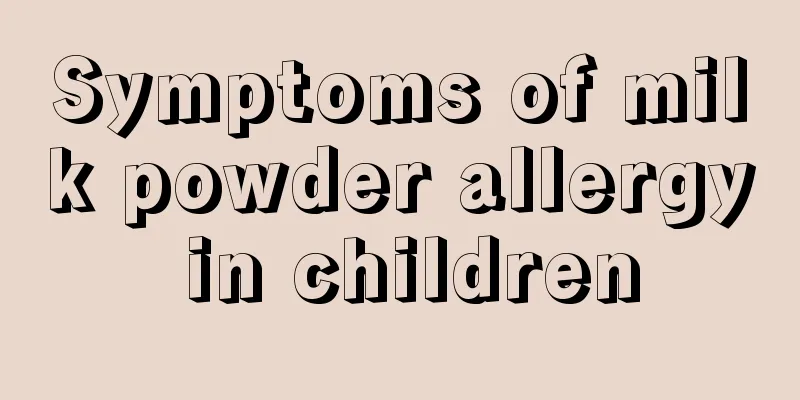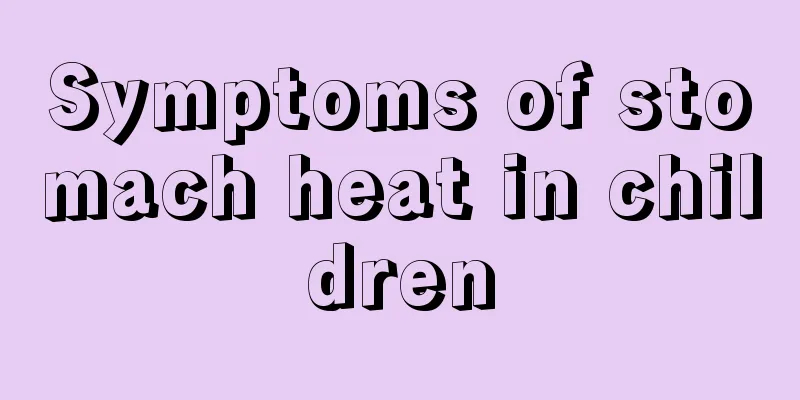Symptoms of milk powder allergy in children

|
Although we usually support mothers to breastfeed, many mothers do not have enough milk or for other reasons their children can only be fed with formula. Although milk powder is a nutritious food that is almost the same as breast milk, it is very beneficial to the health of children. However, some children will have allergies after eating milk powder. This situation is related to the brand of milk powder chosen. But what are the symptoms of children being allergic to milk powder? Milk powder allergy means that the baby has an allergic reaction after drinking formula milk. The allergen is usually milk protein, and the symptoms appear on the skin. Baby's allergy to milk powder is actually because the baby's digestive system is still immature and cannot absorb certain proteins in milk, which causes gastrointestinal allergic reactions. It is understood that certain proteins in milk, such as α-s1 casein and β-lactoglobulin, are currently recognized allergens. The above two proteins generally do not cause allergic reactions in adults, but for babies who are just a few months old, these proteins can induce gastrointestinal allergic reactions. Because newborn babies have insufficient digestive ability and their enzyme system for digesting protein is immature, the protein that enters the body cannot be fully broken down and absorbed into the blood. In addition, babies a few months old lack secretory immunoglobulin A, which is a protective antibody distributed on the surface of the intestinal mucosa that prevents intestinal bacteria from causing inflammation on the mucosal surface. In addition to being allergic to milk protein, another possible reason for a baby's allergic reaction to formula milk is his own allergic constitution, some of which may be related to family genetic characteristics. Milk powder allergy symptoms Mothers want to know whether their babies will be allergic to the milk powder they are eating. This requires everyone to have a certain understanding of the symptoms of baby milk powder allergies, so that they can make scientific judgments and take corresponding solutions in a timely manner. So what are the symptoms of baby milk powder allergy? Common symptoms generally include the following: 1. Skin: Children may have atopic dermatitis or eczema, edema around the lips or eyelids, and most of them may have urticaria. 2. Respiratory aspects: wheezing, frequent coughing, runny nose, rhinitis, etc. may occur. 3. Gastrointestinal tract: There will be symptoms such as milk refusal, vomiting, diarrhea, abdominal pain, bloating, blood in stool, etc. In a small number of cases, milk allergies can also cause constipation in babies. In addition, baby milk powder allergies can be divided into immediate and delayed allergic reactions. Immediate-type allergy refers to an allergic reaction within 2 hours after consuming milk powder containing allergens. The symptoms are generally severe and can be life-threatening. Delayed-type allergy occurs several hours or days after consuming milk powder containing allergens, and the symptoms are relatively mild. Babies who are allergic to milk powder are also prone to cross-allergic reactions, that is, they may also be allergic to goat milk, animal fur, meat, beans and eggs. What to do if you are allergic to milk powder What should I do if my baby is allergic to milk powder? Is it useful to change milk powder? Many mothers have asked this question. In fact, to solve the problem of milk powder allergy, in addition to changing the milk powder method, you can also start breastfeeding or eliminate the allergens. Specific methods to avoid milk powder allergy can refer to the following experience: 1. Adhere to breastfeeding. The best way to prevent milk powder allergies is to breastfeed, and it is best to continue until one year old or even older. Breast milk usually does not cause allergies. 2. Stay away from foods that cause allergies. Limit the intake of foods with allergenic factors such as milk, eggs, fish, peanuts and tree nuts. For infants in high-risk groups, solid food should be introduced after six months, cheese products should be introduced after one year old, eggs should be introduced after two years old, and peanuts, walnuts, and fish should be introduced after three years old. 3. Change milk powder. If your baby is allergic to ordinary formula milk, you should promptly switch to hypoallergenic milk powder. If it is confirmed that the person is allergic to milk protein, "anti-allergic formula" or "soy protein formula" can be used to improve the allergy problem. Babies at high risk of allergies who have a strong family history of allergies can reduce the risk of allergies through exclusive breastfeeding or "anti-allergy formula". In addition, using "partially hydrolyzed formula" may also have similar effects. |
<<: Can I turn on the air conditioner when my child has a fever?
>>: What to do if your baby has trouble digesting breast milk
Recommend
What should I do if my child breaks his tooth while playing?
Nowadays, children are very naughty and often pla...
Can children drink pure milk?
It is helpful for children to drink some pure mil...
Reasons why the tip of the baby's tongue is red
The red tip of the baby's tongue may be cause...
Whooping cough symptoms and prevention in children
Whooping cough in children is a common phenomenon...
What should I do if my child has ADHD?
Children nowadays are becoming more and more acti...
The baby has no pain in his legs but walks lamely
After the baby is born, mothers will encounter va...
What to do if your baby has slow bowel movements
We all know that babies' bodies are not fully...
What causes vertical lines on children's fingernails?
For women who love beauty, in addition to dressin...
What is the reason for dry heaving in a one-month-old baby?
Dry retching in babies has always been a common p...
What should I do if my baby has red stools?
This situation in which babies have red stools du...
What is the reason for green stool in children?
Children's feces are generally yellow, especi...
How long does it take for baby conjunctivitis to heal?
Conjunctivitis is not unfamiliar to many people. ...
Precautions for children taking ascarid medicine
There are many precautions for children to take w...
The timing and order of teeth growth in children
Children go through various stages of growth from...
Dry bloody stool in children
Children's stools are dry and very easy to be...









